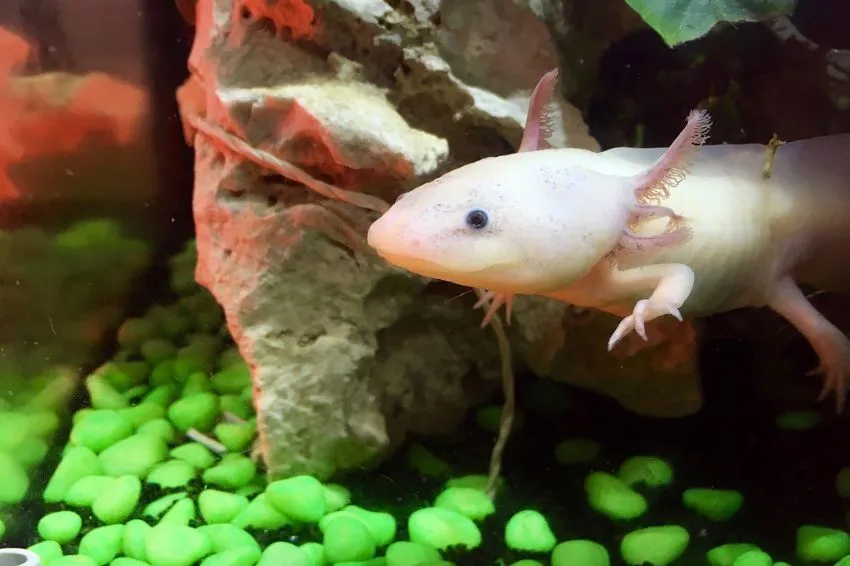Axolotls are fascinating creatures that are native to Mexico. They are often kept as pets and are known for their unique appearance and regenerative abilities.
However, some people wonder if axolotls are edible and what they taste like.
Summary of the article
- Axolotls are considered a delicacy in some parts of the world, but little is known about their nutritional value.
- Eating axolotls can pose health risks, and legal and ethical considerations must be considered.
- Axolotls taste similar to white fish and are often served with beer, but consuming them is not recommended.
Can You Eat Axolotls?
Axolotls are edible and are mainly eaten in restaurants around Asia, specifically in Japan, where they are deemed a gourmet food. According to Axolotl Nerd, the taste of cooked axolotl meat is similar to that of cod or tilapia but has a firmer texture.
However, axolotls are not commonly consumed because they are challenging to collect.
Risks Associated with Eating Axolotls
While axolotls are technically edible, some risks are involved in eating them. According to Amphibian Life, axolotls can carry various diseases and parasites that can harm humans.
Additionally, axolotls are an endangered species, and consuming them can contribute to their decline in the wild.
Other Options for Non-Vegetarian Diets
Suppose you are looking to change your non-vegetarian diet. In that case, plenty of other options are safe for human consumption.
For example, chicken and beef are excellent protein sources and other nutrients necessary for a healthy diet.
Taste and Cooking Methods of Axolotls

After researching, I found that axolotl meat tastes like a combination of chicken and fish with a hint of sweetness.
The taste can vary depending on the cooking method and the spices used.
When it comes to cooking axolotls, several methods can be used. One popular way is to fry them, either by deep-frying or pan-frying.
Fried axolotls are said to be crunchy and have a texture similar to eel or white fish. If you prefer something other than fried food, axolotls can also be boiled or roasted.
If you plan to cook axolotls, it’s important to note that they have bones. However, the bones are relatively small and can be eaten without issue.
Spices such as soy sauce or cumin can be used to add flavor. When cooking axolotls, it’s recommended to use oil with a high smoke point, such as vegetable or canola oil.
Health Risks and Precautions of Axolotls
As with any animal, eating axolotls has potential health risks. Here are some essential precautions to take:
- Endangered Species: Axolotls are an endangered species, and hunting or catching them for any purpose, including consumption, can lead to fines, imprisonment, or other legal troubles. It is essential to respect their status as a protected species and not contribute to further decline.
- Toxins: Axolotls secrete toxins in their skin, which can be harmful when consumed. These toxins can cause digestive issues, nausea, and other health problems. Ensuring that the axolotl has been adequately cleaned and prepared before consumption is crucial.
- Parasites: Axolotls can carry parasites, including tapeworms and flukes, which can be transmitted to humans through consumption. It is vital to thoroughly cook the axolotl to kill any parasites that may be present.
- Antibiotics: Axolotls are sometimes treated with antibiotics to prevent infections. Consuming an axolotl recently treated with antibiotics can lead to antibiotic resistance in humans.
- Bite: Axolotls have sharp teeth and can bite if they feel threatened. It is essential to handle them with care and avoid being bitten.
- Salmonella: Axolotls can carry salmonella bacteria, which can cause food poisoning in humans. It is crucial to take the axolotl carefully and wash your hands thoroughly after handling it.
Legal and Ethical Considerations
As I researched about eating axolotls, I found that there are legal and ethical considerations that need to be considered before consuming these creatures.
Legal Considerations
Axolotls are considered endangered and protected under the Convention on International Trade in Endangered Species of Wild Fauna and Flora (CITES). Therefore, hunting, selling, or trading wild axolotls is illegal.
In addition, some states in the US have laws that prohibit the possession and consumption of axolotls, even if they are bred in captivity.
For example, California, Maine, New Jersey, and Virginia have banned the ownership of axolotls altogether.
Ethical Considerations
Eating axolotls can also raise ethical concerns. Axolotls are intelligent and sensitive creatures capable of feeling pain and suffering.
Therefore, it is crucial to consider the welfare of the animals before consuming them.
Additionally, axolotls are not commonly consumed in most cultures, so eating them may be considered taboo or culturally insensitive.
Captivity vs. Wild
If you are considering consuming axolotls, it is essential to note that captive-bred axolotls are generally considered safer and more ethical than wild-caught ones, which is because captive-bred axolotls are not exposed to the same environmental risks and are typically raised in more controlled and humane conditions.
Range and Habitat
Axolotls are native to the lakes and canals of Mexico City. Still, their range has been dramatically reduced due to habitat destruction and pollution.
As a result, it is crucial to consider the impact of consuming axolotls on their already fragile population.
FAQ
As I researched whether axolotls are edible, I found some frequently asked questions that might help you understand more about this topic.
Eating axolotls can be unsafe and may cause food poisoning. Axolotls are similar to white fish, and eating them raw can bear the risk of containing parasites. Additionally, axolotls are not commonly consumed, and little information about their nutritional value is available.
No, axolotls are not poisonous. The body of an axolotl is not known to bear any harmful toxins at all. However, it is important to note that axolotls can carry bacteria and parasites, which can cause illness if consumed.
There are several risks involved in eating axolotls. Parasitic infections via axolotls eating can lead to nausea, vomiting, diarrhea, and abdominal pain. Additionally, axolotls are not commonly consumed, and little information about their nutritional value is available. Finally, axolotls are an endangered species, and consuming them can contribute to their extinction.
The legality of eating axolotls varies depending on the location. In Mexico, axolotls are a protected species, and it is illegal to consume them. In other parts of the world, axolotls are not protected, and it may be legal to consume them. However, it is important to note that consuming endangered species is generally discouraged and can have legal consequences.





Leave a Reply
You must be logged in to post a comment.